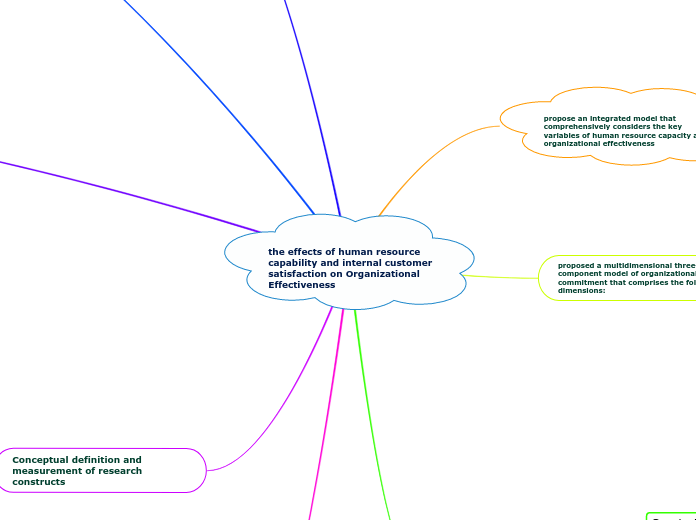the effects of human resource capability and internal customer satisfaction on Organizational Effectiveness
Aforementioned
Of
Chuang, H. M., Liu, M. J., & Chen, Y. S. (2015). The effects of human resource capability and internal customer satisfaction on organizational effectiveness. International Journal of Distributed Sensor Networks, 11(7), 835194.
Conceptual definition and measurement of research constructs
In this study, variables were measured according to previous studies with
modifications based on the context of this study.
Literature Review and Hypotheses
2.1. Human resource capacity
The resource-based view considers competencies, capabilities and skills or strategic assets as key sources of sustainable competitive advantage because they are valuable, rare, difficult to imitate, and irreplaceable.
2.2. Internal customer satisfaction
The nature of internal customer satisfaction
2.3. Organizational commitment
2.3.1. The nature of organizational commitment
2.3.2. Organizational commitment and human resource capacity
2.4. Quality of service
2.4.1. The nature of service quality
2.4.2. Quality of service and internal customer satisfaction
2.4.3. Quality of service and organizational commitment
2.5. Organization effectiveness
2.5.1. The nature of organizational effectiveness
2.5.2. Organizational effectiveness and human resource capacity
2.5.3. Organizational effectiveness and internal customer satisfaction
2.5.4. Organizational effectiveness and quality of service
objetive
to recommend strategies that can effectively improve
the organizational effectiveness of Company-A.
to confirm the variables relevant to HR capability and
organizational effectiveness
to verify the nature of the relationship between
organizational commitment and service quality
to investigate the subjective perception of employees
on HR capability and job satisfaction and its impact
on variables related to organizational performance
(i.e., organizational commitment, service quality, and
organizational effectiveness);
propose an integrated model that effectively delimits the causal variables of HR capacity and organizational effectiveness from a process perspective
to understand the current subjective perceptions of
Company-A employees on the variables relevant to
HR capability and organizational performance
Conclusion and recommendation
recommendation
This study explored HR capacity from the perspective of the
sustainable competitiveness and focused on three dimensions, namely, training, pay for performance and team orientation.
Conclusion
Research results reveal that
internal customer satisfaction, which is highly valued in internal marketing,
was mainly influenced by team orientation, commitment
affective and normative commitment.
proposed a multidimensional three-component model of organizational commitment that comprises the following dimensions:
Continuance commitment
Normative commitment
Affective commitment
propose an integrated model that comprehensively considers the key variables of human resource capacity and organizational effectiveness

